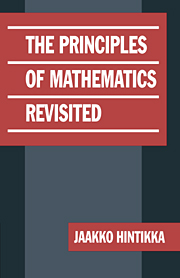Book contents
- Frontmatter
- Contents
- Introduction
- 1 The functions of logic and the problem of truth definition
- 2 The game of logic
- 3 Frege's fallacy foiled: Independence-friendly logic
- 4 The joys of independence: Some uses of IF logic
- 5 The complexities of completeness
- 6 Who's afraid of Alfred Tarski? Truth definitions for IF first-order languages
- 7 The liar belied: Negation in IF logic
- 8 Axiomatic set theory: Fraenkelstein's monster?
- 9 IF logic as a framework for mathematical theorizing
- 10 Constructivism reconstructed
- 11 The epistemology of mathematical objects
- Appendix (by Gabriel Sandu)
- References
- Index of names
- Index of subjects and titles
8 - Axiomatic set theory: Fraenkelstein's monster?
Published online by Cambridge University Press: 15 December 2009
- Frontmatter
- Contents
- Introduction
- 1 The functions of logic and the problem of truth definition
- 2 The game of logic
- 3 Frege's fallacy foiled: Independence-friendly logic
- 4 The joys of independence: Some uses of IF logic
- 5 The complexities of completeness
- 6 Who's afraid of Alfred Tarski? Truth definitions for IF first-order languages
- 7 The liar belied: Negation in IF logic
- 8 Axiomatic set theory: Fraenkelstein's monster?
- 9 IF logic as a framework for mathematical theorizing
- 10 Constructivism reconstructed
- 11 The epistemology of mathematical objects
- Appendix (by Gabriel Sandu)
- References
- Index of names
- Index of subjects and titles
Summary
The backbone of the approach to the foundations of mathematics developed in this book is game-theoretical semantics and the new logic it has inspired, the independence-friendly logic. In the preceding chapters, GTS has opened new perspectives in several directions. IF logic was seen to put the whole array of questions concerning completeness and incompleteness in logic as well as in mathematics in a new light. It frees the model theory of the fetters of set theory by facilitating the formulation of a truth predicate for a suitable IF first-order language in the language itself. Furthermore, in IF first-order languages the important idea of negation turns out to behave in an unexpected way, thereby suggesting that the same might be true of natural languages. But even after all these results many important questions still remain unanswered, including comparative ones. IF logic may have some advantages as a framework of mathematical theorizing, but what has been seen scarcely seems to affect the virtual monopoly of set theory in that department. Admittedly, there is no longer any need to resort to set theory or even to higher-order logic for the purpose of doing model theory of first-order logic. But this relative self-sufficiency of IF first-order languages does not prove their superiority over set-theoretical languages. On the contrary, set theory is still the medium of choice for many mathematicians, philosophers and logicians for modeltheoretical theorizing.
- Type
- Chapter
- Information
- The Principles of Mathematics Revisited , pp. 163 - 182Publisher: Cambridge University PressPrint publication year: 1996



